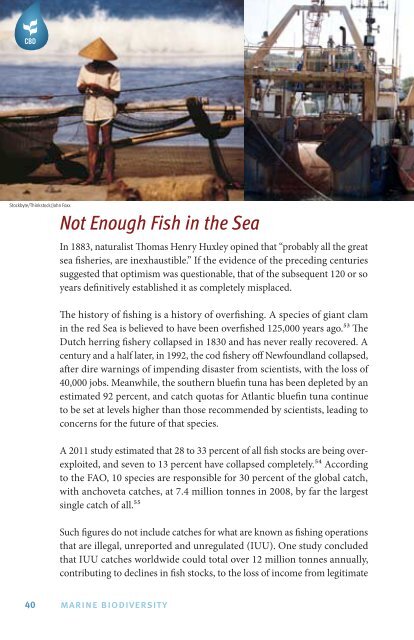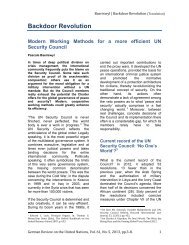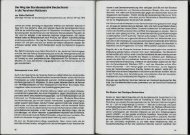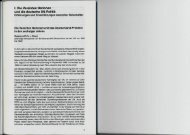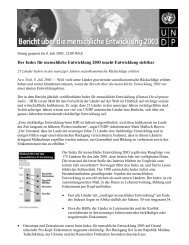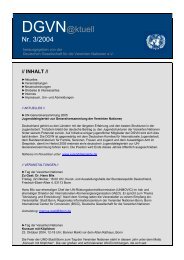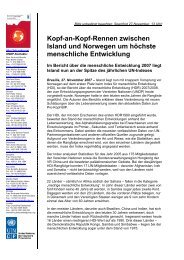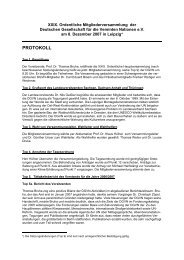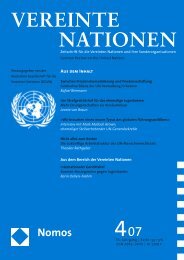One Ocean, Many Worlds of Life - Convention on Biological Diversity
One Ocean, Many Worlds of Life - Convention on Biological Diversity
One Ocean, Many Worlds of Life - Convention on Biological Diversity
Create successful ePaper yourself
Turn your PDF publications into a flip-book with our unique Google optimized e-Paper software.
Stockbyte/Thinkstock/John Foxx<br />
Not Enough Fish in the Sea<br />
In 1883, naturalist Thomas Henry Huxley opined that “probably all the great<br />
sea fisheries, are inexhaustible.” If the evidence <str<strong>on</strong>g>of</str<strong>on</strong>g> the preceding centuries<br />
suggested that optimism was questi<strong>on</strong>able, that <str<strong>on</strong>g>of</str<strong>on</strong>g> the subsequent 120 or so<br />
years definitively established it as completely misplaced.<br />
The history <str<strong>on</strong>g>of</str<strong>on</strong>g> fishing is a history <str<strong>on</strong>g>of</str<strong>on</strong>g> overfishing. A species <str<strong>on</strong>g>of</str<strong>on</strong>g> giant clam<br />
in the red Sea is believed to have been overfished 125,000 years ago.53 The<br />
Dutch herring fishery collapsed in 1830 and has never really recovered. A<br />
century and a half later, in 1992, the cod fishery <str<strong>on</strong>g>of</str<strong>on</strong>g>f Newfoundland collapsed,<br />
after dire warnings <str<strong>on</strong>g>of</str<strong>on</strong>g> impending disaster from scientists, with the loss <str<strong>on</strong>g>of</str<strong>on</strong>g><br />
40,000 jobs. Meanwhile, the southern bluefin tuna has been depleted by an<br />
estimated 92 percent, and catch quotas for Atlantic bluefin tuna c<strong>on</strong>tinue<br />
to be set at levels higher than those recommended by scientists, leading to<br />
c<strong>on</strong>cerns for the future <str<strong>on</strong>g>of</str<strong>on</strong>g> that species.<br />
A 2011 study estimated that 28 to 33 percent <str<strong>on</strong>g>of</str<strong>on</strong>g> all fish stocks are being overexploited,<br />
and seven to 13 percent have collapsed completely.54 According<br />
to the FAO, 10 species are resp<strong>on</strong>sible for 30 percent <str<strong>on</strong>g>of</str<strong>on</strong>g> the global catch,<br />
with anchoveta catches, at 7.4 milli<strong>on</strong> t<strong>on</strong>nes in 2008, by far the largest<br />
single catch <str<strong>on</strong>g>of</str<strong>on</strong>g> all.55<br />
Such figures do not include catches for what are known as fishing operati<strong>on</strong>s<br />
that are illegal, unreported and unregulated (IUU). <str<strong>on</strong>g>One</str<strong>on</strong>g> study c<strong>on</strong>cluded<br />
that IUU catches worldwide could total over 12 milli<strong>on</strong> t<strong>on</strong>nes annually,<br />
c<strong>on</strong>tributing to declines in fish stocks, to the loss <str<strong>on</strong>g>of</str<strong>on</strong>g> income from legitimate<br />
40 Marine BiOdiversity


